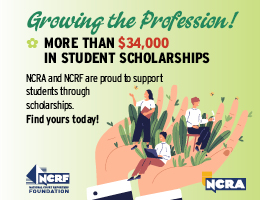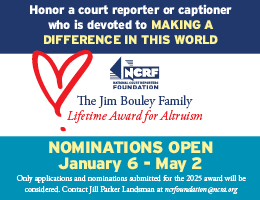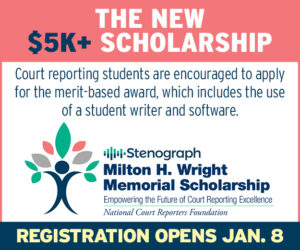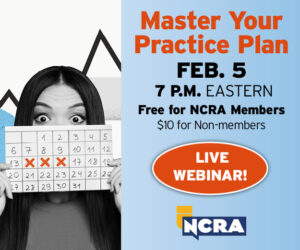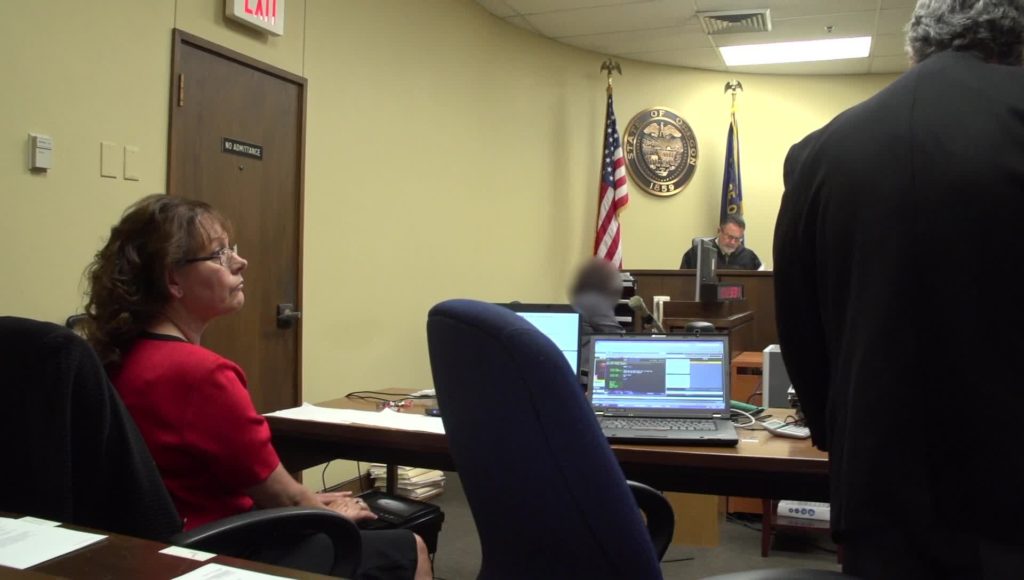
Leaving a legacy lets us be sure that we can have a continuing impact on the future of what matters to us most for generations to come. The National Court Reporters Foundation Legacy Society is a way for NCRA members to give back to the court reporting and captioning professions by naming the philanthropic arm of the National Court Reporters Association as a beneficiary in their estate planning. Choosing to be part of the NCRF Legacy Society ensures a donor that their commitment to supporting the future of the profession will continue well after they are gone.
The impetus for the NCRF Legacy Society followed a donation made by NCRA member and past president Rachel Lerschen, FAPR, RMR, a freelance court reporter from Bloomington, Minn., who passed away in 1996. Prior to her death, Lerschen arranged for a contribution to the Foundation in her will and, thus, became the first donor through her estate planning.
Today, more than a dozen NCRA members have included the Legacy Society as part of their estate planning. Most recently, NCRA member and NCRF Trustee Debra Cheyne, MA, CSR, a captioner from Sherwood, Ore., who is also certified in Washington, was the most recent NCRA member to make a provision in her estate planning to benefit the Legacy Society.
“I first learned about the Legacy Society when reading the JCR magazine, and I noticed a page dedicated to a colleague’s legacy provision,” said Cheyne, who has worked as a realtime captioner for 25 years.
“I, like most people, want to leave the world a better place for having been given the gift of life. The National Court Reporters Foundation’s philanthropic programs make our world a better place. Becoming a member of the Legacy Society helps ensure the next generation of court reporters will have the support through scholar-ships and grants to succeed in continuing our role as verbatim guardians of the record.”
Cheyne said that she believes that one of the greatest values of the Legacy Society is providing role models of good leadership, service above self, and promoting the professional of the future.
Donations to NCRF through the Legacy Society or any other estate planning program can be designated as a specific amount or a percentage, either through a final will or an insurance policy. Including charitable donations in a final will can also offer the giver a number of benefits, such as protecting their assets by controlling where they will go, reducing estate taxes, and avoiding capital gains taxes. Donations to NCRF can take the form of the following:
■Outright Gifts: Outright gifts can be used immediately. A gift of appreciated stock or mutual fund shares can be particularly advantageous from a tax standpoint since capital gains tax is avoided.
■Bequests: A bequest to NCRF’s Legacy Society in a will allows a person to leave a particular asset, a percentage of an estate, or a portion of assets remaining after other specific bequests for family members have been made. A bequest to NCRF’s Legacy Society is fully deductible for estate tax purposes.
■Life Insurance: Naming NCRF as the beneficiary of all or a portion of a life insurance policy is another option. Amounts left to NCRF are fully deductible for estate tax purposes.
Supporting NCRF through its Legacy Society or any of its other giving programs also supports several goals in the Foundation’s strategic plan. Among those goals are building and operating a sustainable organization that can continue to collect and preserve the history of the profession, increasing annual funding to create and grow new programs that advance the court reporting and captioning professions, increasing funding for the expansion of NCRA’s A to ZTM Intro to Steno Machine Shorthand program, and increasing the amount of financial assistance awards such as scholarships and grants given over the next several years.
“My court reporting career nurtures a lifelong curiosity to continually learn; every day there’s a different and unique ‘topic,’” said Cheyne. “As an officer of the court, our certification requires that we be unbiased. Standing (but usually sitting!) in the middle, hearing ‘both sides,’ promulgates a broader world view, increases tolerance and understanding. My court reporting profession has taught me the value of walking a mile in another’s shoes.”
Cheyne, along with and her late husband, attorney Jeffrey McCauley Cheyne, have also supported NCRF as Major Gift and NCRF Angel donors.
“Giving back to a profession that’s been so good to me not only helps others, it also provides tangible and positive effects on the future. In college, I was re-quired to take Theology. One concept from that study that’s stuck with me is bodhisattva: You reach one hand up for help and one hand down to help others,” added Cheyne. If you would like information on how to leave a lasting legacy and become a member of NCRF’s Legacy Society, contact Mary Petto, deputy director of NCRF, at 800-272-6272, ext. 122, or by email at mpetto@ncra.org


